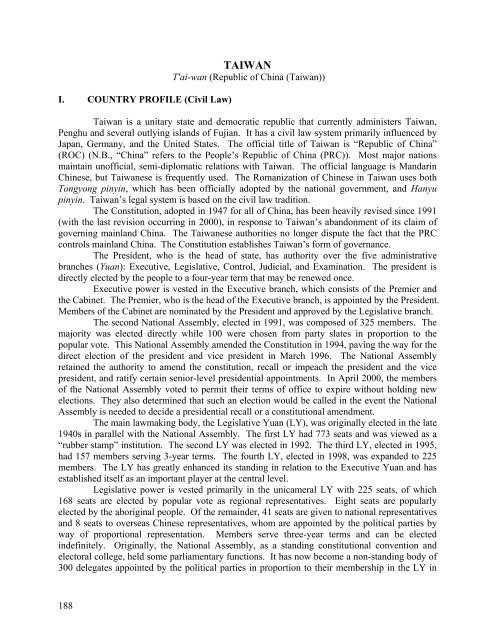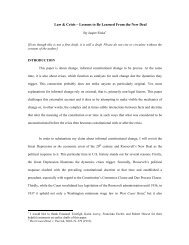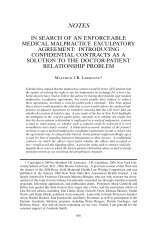Guide to Foreign and International Legal Citations - New York ...
Guide to Foreign and International Legal Citations - New York ...
Guide to Foreign and International Legal Citations - New York ...
You also want an ePaper? Increase the reach of your titles
YUMPU automatically turns print PDFs into web optimized ePapers that Google loves.
I. COUNTRY PROFILE (Civil Law)<br />
188<br />
TAIWAN<br />
T'ai-wan (Republic of China (Taiwan))<br />
Taiwan is a unitary state <strong>and</strong> democratic republic that currently administers Taiwan,<br />
Penghu <strong>and</strong> several outlying isl<strong>and</strong>s of Fujian. It has a civil law system primarily influenced by<br />
Japan, Germany, <strong>and</strong> the United States. The official title of Taiwan is “Republic of China”<br />
(ROC) (N.B., “China” refers <strong>to</strong> the People’s Republic of China (PRC)). Most major nations<br />
maintain unofficial, semi-diplomatic relations with Taiwan. The official language is M<strong>and</strong>arin<br />
Chinese, but Taiwanese is frequently used. The Romanization of Chinese in Taiwan uses both<br />
Tongyong pinyin, which has been officially adopted by the national government, <strong>and</strong> Hanyu<br />
pinyin. Taiwan’s legal system is based on the civil law tradition.<br />
The Constitution, adopted in 1947 for all of China, has been heavily revised since 1991<br />
(with the last revision occurring in 2000), in response <strong>to</strong> Taiwan’s ab<strong>and</strong>onment of its claim of<br />
governing mainl<strong>and</strong> China. The Taiwanese authorities no longer dispute the fact that the PRC<br />
controls mainl<strong>and</strong> China. The Constitution establishes Taiwan’s form of governance.<br />
The President, who is the head of state, has authority over the five administrative<br />
branches (Yuan): Executive, Legislative, Control, Judicial, <strong>and</strong> Examination. The president is<br />
directly elected by the people <strong>to</strong> a four-year term that may be renewed once.<br />
Executive power is vested in the Executive branch, which consists of the Premier <strong>and</strong><br />
the Cabinet. The Premier, who is the head of the Executive branch, is appointed by the President.<br />
Members of the Cabinet are nominated by the President <strong>and</strong> approved by the Legislative branch.<br />
The second National Assembly, elected in 1991, was composed of 325 members. The<br />
majority was elected directly while 100 were chosen from party slates in proportion <strong>to</strong> the<br />
popular vote. This National Assembly amended the Constitution in 1994, paving the way for the<br />
direct election of the president <strong>and</strong> vice president in March 1996. The National Assembly<br />
retained the authority <strong>to</strong> amend the constitution, recall or impeach the president <strong>and</strong> the vice<br />
president, <strong>and</strong> ratify certain senior-level presidential appointments. In April 2000, the members<br />
of the National Assembly voted <strong>to</strong> permit their terms of office <strong>to</strong> expire without holding new<br />
elections. They also determined that such an election would be called in the event the National<br />
Assembly is needed <strong>to</strong> decide a presidential recall or a constitutional amendment.<br />
The main lawmaking body, the Legislative Yuan (LY), was originally elected in the late<br />
1940s in parallel with the National Assembly. The first LY had 773 seats <strong>and</strong> was viewed as a<br />
“rubber stamp” institution. The second LY was elected in 1992. The third LY, elected in 1995,<br />
had 157 members serving 3-year terms. The fourth LY, elected in 1998, was exp<strong>and</strong>ed <strong>to</strong> 225<br />
members. The LY has greatly enhanced its st<strong>and</strong>ing in relation <strong>to</strong> the Executive Yuan <strong>and</strong> has<br />
established itself as an important player at the central level.<br />
Legislative power is vested primarily in the unicameral LY with 225 seats, of which<br />
168 seats are elected by popular vote as regional representatives. Eight seats are popularly<br />
elected by the aboriginal people. Of the remainder, 41 seats are given <strong>to</strong> national representatives<br />
<strong>and</strong> 8 seats <strong>to</strong> overseas Chinese representatives, whom are appointed by the political parties by<br />
way of proportional representation. Members serve three-year terms <strong>and</strong> can be elected<br />
indefinitely. Originally, the National Assembly, as a st<strong>and</strong>ing constitutional convention <strong>and</strong><br />
elec<strong>to</strong>ral college, held some parliamentary functions. It has now become a non-st<strong>and</strong>ing body of<br />
300 delegates appointed by the political parties in proportion <strong>to</strong> their membership in the LY in
















